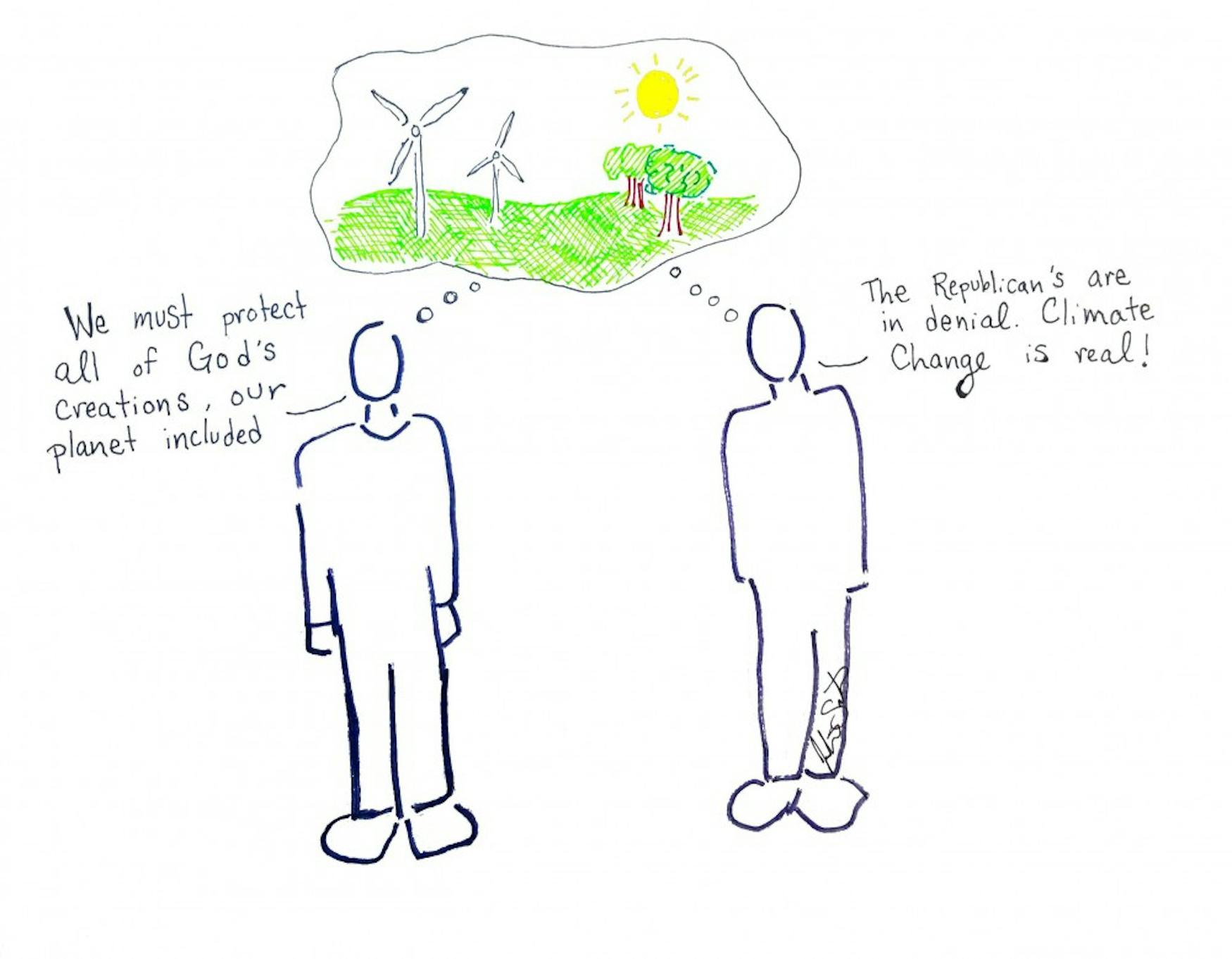Urge more conservatives to speak on climate change
Bridging the partisan divide on global warming seems next to impossible at first glance — and understandably so. Global warming clearly ranks low on the U.S. government’s priority list, and the lack of any serious climate-related proposals from a Republican-controlled Congress speaks volumes. It is no secret that the U.S. has alienated the rest of the world by failing to act, and much of this is due to the bizarre politics surrounding climate change.
The American perception, one that cable news pundits amplify, is that climate change believers are lumped into one social group — the coastal elite — while those who reject it are boxed into another: everyone else. It is merely human to adhere to the values of one’s group, so social confines restrict many Republicans from appreciating the seriousness of climate change and subsequently being branded a “tree hugger.” Similarly, I sometimes catch myself glossing over arguments in support of a pro-life position, because taking them seriously would blaspheme my Democratic Party. Accepting the other side’s arguments may as well mean becoming them, and in case you forgot, both sides really don’t like each other.
Environmental activists dream of reshaping the partisan status quo. They may have some success but probably not as much as Katharine Hayhoe, an evangelical climate scientist and political conservative. She seeks to spread the gospel of global warming mitigation while invoking religious themes. According to a 2014 study from the American Academy of Religion and the Public Religion Research Institute, approximately two-thirds of white evangelical protestants were reportedly “unconcerned” about global warming. Recognizing this apathy, she incorporates her Christian values in efforts to change minds. Hayhoe wrote in a June 5, 2015 post on her website, “For Christians, climate change directly intersects with mandates to be responsible for creation, to love others as Christ loved us, and to care for the poor and the needy.” Her message has proved successful. Her lectures have been shown to positively influence her audience’s perception about the reality of global warming and the harm it will cause, according to a March 2016 Harvard Thesis by Brian Webb.
People like Hayhoe are essential to the climate movement: She empathizes with people whose beliefs and values do not obviously align with left-leaning activists. Why aren’t more voices like hers heard? After all, one could argue that addressing climate change is inherently conservative; it strengthens our national security; fortifies the American promise to life, liberty and the pursuit of happiness; and will save billions of taxpayer dollars that would have otherwise been spent on disaster relief over the next century. But why hear this from me? Why not listen to the 31 percent of Republicans — as reported by Yale University — who believe global warming is man-made?
While liberals may groan at this statistic, the number is quite large, and every one of these people have reasons for accepting the science. So, I ask, what are their stories? Who or what helped them break through the seemingly impervious wall of partisanship? Their voices must be amplified; skeptical conservatives will more likely act on climate change once they realize they do not have to sacrifice their identity to accept it.
Climate scientists who communicate the issue often underestimate the impact storytelling and common values have on the public opinion and instead rely on, well, the science. After all, if human-caused climate change is factual, shouldn’t numbers and statistics be enough? Yet, shoving graphs down skeptics’ throats at the rate of arctic ice decline probably won’t change their minds. What good does data serve if your audience does not listen? Rather, start off a conversation about shared beliefs and talk about the science later — or maybe not at all. People are not strictly rational machines, and most of them probably have no interest in atmospheric science, anyway.
Changing the mind of a climate change skeptic is difficult work. While liberals may have some success swaying conservatives by drawing upon common morals, this could prove insufficient in making a real difference. A shared identity does matter. Imagine the impact Sean Hannity could have on conservatives if he announced on Fox News tonight that he supported bipartisan climate change legislation.
Obviously, liberals should play a paramount role in the climate movement; they should continue raising awareness and lobbying their representatives to implement solutions. However, they must not dominate the public conversation. Liberals should make room for a diverse group of conservatives who accept global warming — evangelical Christians, libertarians, moderates — to speak publicly about the issue and provide their ideas about fixing it. They must have space to express their views on cable news programs and opinion pieces. Liberals should encourage conservatives to join the climate coalition, rather than alienate them. This way, we can establish a bipartisan coalition and regain our status in the international community.



Please note All comments are eligible for publication in The Justice.